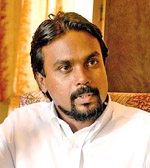Conflict not the biggest stumbling block for economic growth - Wimal
Weerawansa
by Gamini Warushamana
|

Wimal Weerawansa
|
The war is not the sole and the most serious stumbling block for
economic growth. For long lasting peace, LTTE terrorism should be
defeated militarily and democracy should be restored in the North and
East, said JVP parliamentarian Wimal Weerawansa.
Weerawansa told a Business Forum in Colombo on Thursday, that corrupt
politicians and governments are bigger stumbling blocks for development
than the war.
He denounced the popular views against war and for peace and stressed
that any short-sighted solution to the national question without
defeating terrorism would worsen the crisis.
The Business for Peace Forum was organised by the Business for Peace
Initiative of the Federation of Chamber of Commerce and Industries in
Sri Lanka (FCCISL).
He said today all political parties, diplomatic missions in Sri
Lanka, NGOs and foreign delegates frequently visiting the country and
various other groups stress the need to build peace in Sri Lanka.
However, the meaning of peace that is stressed by each group is
different. Some parties want to divide the country according to
ethnicity. This peace would be short term and it would create worse
situations in the long run, he said.
Others want to defeat terrorism permanently and address the true
grievances of the people in the North and East. They do not want to
compromise the sovereignty and territorial integrity of the country. We
all need peace but we have different ways of establishing peace in the
country, Weerawansa said.
The short term conflict in a country is not a grave threat for
development. If we see the world map most countries are in a similar
crisis. Those who are coming to us today to learn about peace are
actually creating these conflicts. They used minor differences among
people on ethnic grounds or religion to ignite conflicts and wars for
their personal gains or loot natural resources, Weerawansa said.
He said that the fate Sudan faces today was created by those peace
brokers. Norway and Finland initiated the so-called peace process in
Sudan. Finally they divided the country on religious lines and created a
new country. The oil rich territory of Sudan was divided and now Erik
Solheim is advising them on oil management.
The fate of East Timor is also the same. Today the conditions of
people are worse. East Timor oil resources are being looted by
Australia. As Noam Chomsky said Australia did not sense the smell of the
Timor people's blood and they sensed the smell of oil in East Timor.
They divide countries and exploit the resources and people are left with
only the remnants and a flag.
He pointed out that the motivation of external forces involved in Sri
Lanka's conflict is mostly economic. They are eyeing the petroleum
resources in Cauvary and the Mannar Basins. They want to divide the
country on ethnic lines and loot it as they did in East Timor and Sudan
today.
The war adversely affects some sectors of the economy such as
tourism. The business community should not consider short-sighted
solutions for short run profits. The business community has a greater
responsibility in the peace process. Today the power of decision making
for peace and development in the country, is with foreign forces.
This should be changed and Sri Lankans should come to the fore
overcoming these foreign forces in making the right decision.
[email protected] |
